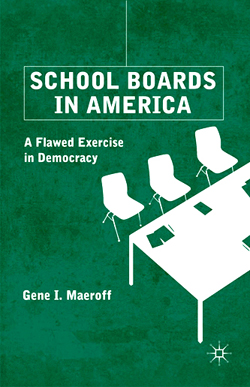Book Review: Gene Maeroff's School Boards in America: A Flawed Exercise in Democracy
Education journalist Gene Maeroff's account of his deep dive into service on the Edison, New Jersey school board offers a powerful confirmation of Winston Churchill's famous observation that democracy is the worst form of government-'"except for all those other forms that have been tried from time to time.
Education journalist Gene Maeroff’s account of his deep dive into service on the Edison, New Jersey school board offers a powerful confirmation of Winston Churchill’s famous observation that democracy is the worst form of government—except for all those other forms that have been tried from time to time.
At a moment when foundations and big cities are rejecting participatory school governance as dysfunctional and instead embracing a school system model marked by strong mayoral control, Maeroff—the former New York Times reporter and founding director of TC’s Hechinger Institute for Education and the Media (where he is still a senior fellow)—finds something distinctly bracing in the notion of public involvement in public schools.
In School Boards in America: A Flawed Exercise in Democracy (released late last year by Palgrave MacMillan), Maeroff recounts his candidacy in 2008,subsequent service and current board presidency in Edison, New Jersey’s fifth largest district. He decided to serve both out of a genuine civic desire to help and also curiosity about an aspect of school governance he believes are poorly understood and “easy to overlook”—even though the more than 14,000 boards across the nation command budgets totaling nearly $600 billion.
“My work on the board reinforced my conviction that people ought to know more about school boards,” Maeroff writes. “These bodies spend a lot of the public’s money, provide millions of jobs and most importantly, help shape the future for young Americans.”
In School Boards in America, Maeroff explores issues such as accountability, teacher practice and special education mandates, all through the lens of these governing bodies. He also devotes a chapter to the hiring of superintendents, a process he personally experienced after being elected President of the Edison board in 2010.
Certainly Maeroff finds much about school boards that needs improvement. In particular, he believes that boards should be appointed, not elected, and that board members should be provided with increased opportunities for professional development. But he also documents some major successes of boards around the country. In the mid-2000s, the Denver Public School Board was able to combat three major issues: low test scores, a high dropout rate and an ineffective program for English Language Learners. Maeroff believes the key to those accomplishments was the board’s willingness to work with Superintendent Michael Bennet rather than pursue their own individual agendas. The board members were also well-informed and had the support of outside consultants, community leaders and local foundations.
Ultimately Maeroff is “not persuaded that elementary and secondary education would be that much better if school boards did not exist.” He concludes that “There is perhaps no greater experience for which a man or woman can volunteer” than school board service.”
Published Monday, Mar. 28, 2011
